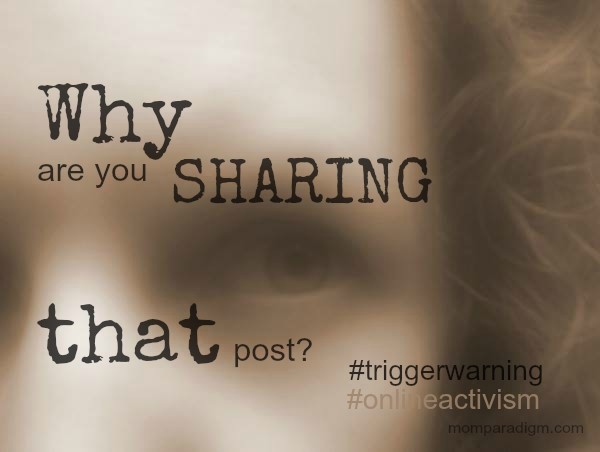Why Are You Sharing That Post?
This is a guest post by Pamela Chan.
Be careful of your thoughts for they become words. Be careful of your words for they become actions. Be careful of your actions for they become habits. Be careful of your habits for they become your character. Be careful of your character for it becomes your destiny. ~ Author unknown
When you share a link to an article on Facebook, that act of sharing is a form of **online activism or click activism. But have you thought about the reasons why you are sharing that post? My guess is that you’re probably thinking one or more of the following things:
You might not know this, so here’s some information.
You might not want to know about this but here it is.
You know about this and here’s some more info.
You know about this but don’t do anything to help stop it, so here it is.
I know you know and care about this topic and here’s some information.
I care about this information. I wish more did too.
The possibilities are endless. But what about when you share a link that generates a photograph on your contact’s Facebook or Twitter homepage? And what if that photograph depicts an aggressive sexual assault on someone or documents an attack on someone, maybe a minor, that is about to start (and supposedly stopped). Or maybe it’s fictional, a depiction of an attack involving actors? I think this is where the line has been crossed.
There is a high – very high – probability that if you have a large enough friends list, there will be women and/or men that you know who have been sexually assaulted at least one time in their life.
Do you want to remind them over and over?
Recently, two links were shared on my Facebook homepage that contained graphic images of someone being assaulted.
I was appalled.
And I couldn’t understand what sharing these links and images were meant to accomplish.
I couldn’t help but think about other people who saw this image that appeared to depict a youth (with a blurred face in the photo), sitting on a couch, with two men looming above ready to commit a sexual assault.
Perhaps some of these people scrolling through their Facebook homepage had their own personal experience of sexual assault during their youth. Perhaps these experiences took place over an extended period of time. Perhaps they didn’t have any personal experiences but someone they know did. Perhaps family members and close friends were involved, resulting in a traumatic breach of trust.
There are many ‘perhaps’ in this situation. But there is no good reason to cause someone to relive painful, traumatic memories by sharing what, at first glance, looks like a photo of an actual assault.
The photographs that accompanied these articles could be strong triggers for some individuals. They can also be strong triggers for individuals whose loved ones were assaulted. What is this link sharing supposed to achieve?
If you should choose to participate in online activism think about how you can affect change for the better of society rather than just a click of the ‘like’ button. And if you’re stuck on how you can do that, have a look at the list below.
Take positive action instead
-
We can share links with stories about organizations that are working effectively to make a change.
-
We can share information about how we are working in our communities to effect change.
-
We can share statistics. People will probably find them to be surprising.
-
We can share information about how people we know (or people we don’t know) are making a difference.
-
Share information about community events such as a talk, meeting, fundraising walk or benefit etc. There are local organizations and groups that are helping to support victims and their families and/or helping to educate others and bring about change in our communities.
You CAN make a difference. Just make it meaningful.
[Tweet “Use #triggerwarning before posting links to graphic images.You might hurt someone.#thinkbeforelink #onlineactivism”]
How will you change the way you share information on social media now that you’ve read this post?
The links below are those referred to above. Take care when opening.
Trigger warning: Lady Gaga Video: You might not want to click this link if you’ve sensitive to graphic images of sexual assault.
Trigger warning: This ‘experiment’ is not only shocking but cruel to the young people involved. >> The dangers of social media: Social Experiment: Child predators attack a young boy.
**Definition of online activism: Wikipedia
About the Author: Pamela Chan lives in the Tri Cities area near Vancouver with her husband and six-year-old twins. On BCfamily.ca she writes about ideas that strengthen our communities and celebrate multiculturalism in British Columbia. You can find Pamela on Facebook and on Twitter @bcfamilyca @BCFamilyMedia.

skapa binance-konto says
Your point of view caught my eye and was very interesting. Thanks. I have a question for you.
binance код says
Can you be more specific about the content of your article? After reading it, I still have some doubts. Hope you can help me.